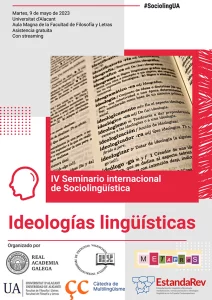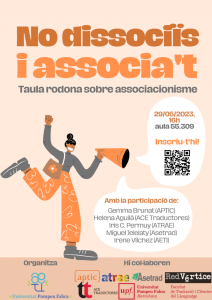Once a month, the Translation Studies Reading Group of the Trinity Centre for Literary & Cultural Translation comes together to discuss an article recently published in a Translation Studies journal.
The group is free and open to anyone in the world to join in with, irrespective of academic level or affiliation. All you need to do is read the article before the group meets and sign up. Everyone is encouraged to join in with the conversation and add their own viewpoints. We are not able to send the articles to people who do not have access to them.
The details of the article we will read for this month’s Reading Group are below. Please follow the link for access to the full article.
Pilar Ordóñez López & Rosa Agost
Future translatorsʼ views on translation theory: a qualitative approach
The practical orientation of undergraduate translation and interpreting degrees in Spain means that less importance is given to theoretical modules, and it is often thought that students doubt the usefulness of these modules and are therefore reluctant to take them. Previous empirical researchhas shown that students are not as averse to theory as is often assumed; in fact, according to these studies, students rate its contribution to their training quite positively. In order to take a further step in the study of students’ views on translation theory, the present study adds a qualitative perspective to (in)validate the results obtained in previous research and explore them in greater depth. Students’ answers to open questions are analysed using Atlas.ti qualitative analysis software to assess how translation theory contributes to their training and identify the strengths and weaknesses of the translation theory module at Jaume I University (Castellón, Spain). Our findings show that fitting translation theory into the training and education of translators is a complex task and they also reveal that cognitive restructuring is needed to help students overcome their tendency to associate theory with complex, dense, difficult-to-grasp and, ultimately, useless concepts.
El IV Seminario internacional de Sociolingüística tendrá lugar el 9 de mayo de 2023 en el Aula Magna de la Facultad de Filosofía y Letras de la Universitat d’Alacant y se retransmitirá gratuitamente por streaming desde esta dirección: https://si.ua.es/es/videostreaming/filosofia-y-letras.html
Las personas que asistan solamente en línea no podrán tener certificado de asistencia porque el programa no permite controlar la asistencia real.
En su canal de YouTube se pueden encontrar los vídeos de los seminarios anteriores:
I Seminario: https://youtube.com/playlist?list=PLsRZfy60RkwDK8Ot8miO1YqGLz2BPVFek
II Seminario: https://youtube.com/playlist?list=PLsRZfy60RkwCw6WKyPRxjVwAZ3eZmKZ7Z
III Seminario: https://www.youtube.com/watch?v=Ir1Jwg1Yt9o (por la mañana)
https://www.youtube.com/watch?v=3cQv_Qnx4X0 (por la tarde)
La XXVII edición del Premio Andreu Febrer de Traducción Literaria propone trabajar la traducción de poesía del siglo XIX y principios del XX.
El Premio está dirigido a estudiantes de grado y máster en Traducción e Interpretación, Lenguas Aplicadas, Filologías o disciplinas afines de cualquier facultad del Estado español, y la fecha límite para enviar candidaturas es el 15 de mayo de 2023.
Podéis consultar las bases y dirigiros a la secretaría del premio (premi.andreufebrer@uvic.cat) en caso de duda.
Once a month, the Translation Studies Reading Group of the Trinity Centre for Literary & Cultural Translation comes together to discuss an article recently published in a Translation Studies journal.
The group is free and open to anyone in the world to join in with, irrespective of academic level or affiliation. All you need to do is read the article before the group meets and sign up. Everyone is encouraged to join in with the conversation and add their own viewpoints. We are not able to send the articles to people who do not have access to them.
The details of the article we will read for this month’s Reading Group are below. Please follow the link for access to the full article.
Magdalena Oziemblewska & Agnieszka Szarkowska
The quality of templates in subtitling. A survey on current market practices and changing subtitler competences
The rapidly growing demand for subtitling on the global translation market has resulted in a new development which has revolutionised the way subtitles are created and distributed: the template. A template is a subtitle file containing a time-coded transcription of the dialogue to be later translated into multiple target languages. Loved by global subtitling companies and frowned upon by subtitlers, templates have become an inseparable part of modern subtitling workflows. The goal of our study is to examine this new development in terms of quality, its impact on the profession and the resulting changes in subtitler competences. With this goal in mind, we conducted an online survey which was completed by 344 professionals from 47 countries involved in the subtitling process with templates. We gathered data on the content of the templates, subtitling workflows, types of software, pivot translation, annotations, and language combinations. We found important differences in spotting skills between subtitlers depending on their experience and type of company they work for. Our results also show that the quality of templates currently available on the market is rather inadequate. We present suggestions for improvement based on the subtitlers’ views. The results may be used to inform current market practices.
La Facultad de Derecho y Humanidades de la UIC organiza la tercera Jornada Internacional de Lenguaje Jurídico, que se podrá seguir también virtualmente.
La Universidad Complutense de Madrid (UCM) y la Unión de Correctores (UniCo) organizan las I Jornadas de Edición y Corrección que también serán retransmitidas en línea de manera simultánea.
Inscripción (gratuita pero obligatoria)
Chartered Institute of Linguists Webinars
Literary translation: turning your first book project into a regular stream of work
Ruth Ahmedzai Kemp shows how working for publishers and the media in various capacities can be a sustainable strand to a portfolio freelance business, as well as providing a marketing platform and exposure for your creative translation ability. Taking a pragmatic look at the creative and business skills involved in marketing yourself as a translator of fiction and non-fiction texts, and at the same time developing the market for the literature of your source language, Ruth will share a wealth of tips on how to turn one book translation into a regular stream of work.
Las I Jornadas de Literaturas Hispánicas de UNIR tienen como objetivo analizar las nuevas narrativas del siglo XXI, en un momento en el que se ha experimentado un nuevo boom de la narrativa escrita en español a ambos lados del Atlántico, con un espíritu global, que ya no atiende a nacionalidades o identidades particulares.
Inscripciones para asistir en línea hasta el 27 de junio a las 9 h.










